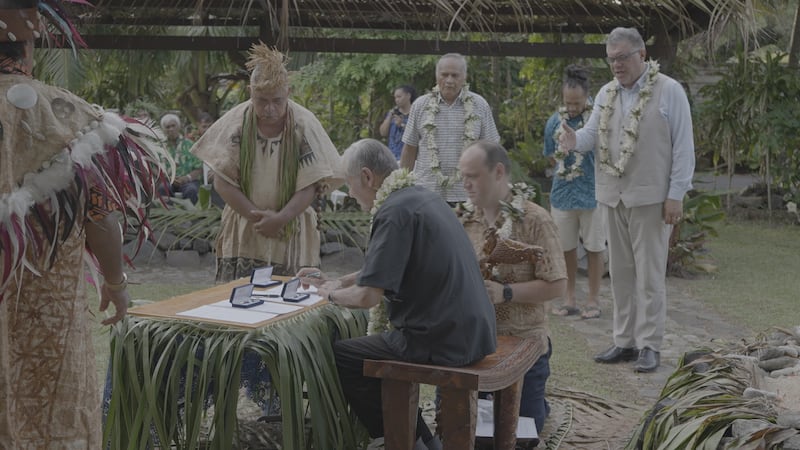At Turangawaewae Marae two historical declarations were signed today for the protection of whales and the use of ancestral knowledge for the betterment of future generations.
Indigenous leaders joined Kiingi Tuheitia as signatories for He Whakaputanga Moana and Tuurama Ariki declarations.
Marissa Merculieff of the Aleut Community of St. Paul Island signed He Whakaputanga Moana, which is a ‘Hinemoana Halo’ - a cloak of protection for whales.
In March Māori leaders including Kiingi Tuheitia endorsed and signed He Whakaputanga Moana at Atupare Marae, House of Ariki Estate, Rarotonga, Cook Islands.
Aperahama Edwards of Ngātiwai said the declaration called for whales to be granted legal personhood and outlined a plan for their protection.
“We are grateful for the leadership of our ariki, particularly Kiingi Tuheitia who was a founding signatory of He Whakaputanga Moana,” he said.

“As the king said, the sound of our ancestor’s song has become weaker and her habitat is under threat and we must act now.”
The declaration aims to ensure future generations will inherit an ocean teeming with life and the songs of whales.
After that declaration was signed, King Pomare of Tahiti signed Tuurama Ariki, a declaration by indigenous leaders that they will use their ancestral knowledge for the betterment of future generations - including the advocacy for issues impacting the planet.
Tuurama Ariki refers to the wisdom of ancestors guiding the journey ahead. The name was proposed by Kiingi Tuheitia, Rikirangi Gage of Te Whānau-a-Apanui said.
“Signatories to Tuurama Ariki are committed to advocating on issues such as climate change, environmental protection, economic development and globalisation and using indigenous knowledge to help solve some of these challenges,” Gage said.
The declaration received widespread support from ariki across Te Moana-nui-ā-Kiwa.
Key elements of the He Whakaputanga Moana Declaration:
• Recognition of whale personhood: The declaration acknowledges whales’ inherent mana and wairua, recognising them as legal persons with inherent rights;
• Rights of whales: These rights include freedom of movement, natural behaviour development, cultural expression, a healthy environment and restoration of their populations;
• Holistic whale protection: The declaration calls for establishing marine protected areas, implementing dynamic rāhui (customary restrictions), and integrating mātauranga Māori (indigenous knowledge) with science for better whale protection.
• Community empowerment and collaboration: The declaration emphasises the crucial role of Polynesian communities and fosters regional collaboration for whale conservation.
• Hinemoana Halo Ocean Protection Fund: The establishment of a dedicated fund to support initiatives aligned with the declaration’s goals is proposed.
• Global leadership: All nations are urged to recognise the global value of whales and contribute to their protection.
• Education and public awareness: Raising awareness about the importance of whales and the need for urgent action is a key priority.
• Continuous improvement: The declaration is envisioned as a living document, open to adaptation based on new information and feedback.
• Future generations: Engaging youth in whale conservation efforts is crucial to ensure their continued leadership.



